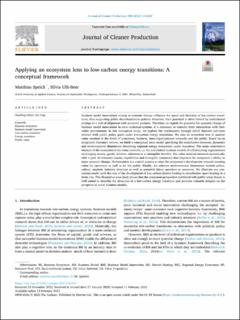Bitte benutzen Sie diese Kennung, um auf die Ressource zu verweisen:
https://doi.org/10.21256/zhaw-29273| Publikationstyp: | Beitrag in wissenschaftlicher Zeitschrift |
| Art der Begutachtung: | Peer review (Publikation) |
| Titel: | Applying an ecosystem lens to low-carbon energy transitions : a conceptual framework |
| Autor/-in: | Speich, Matthias Ulli-Beer, Silvia |
| et. al: | No |
| DOI: | 10.1016/j.jclepro.2023.136429 10.21256/zhaw-29273 |
| Erschienen in: | Journal of Cleaner Production |
| Band(Heft): | 398 |
| Heft: | 136429 |
| Erscheinungsdatum: | 20-Apr-2023 |
| Verlag / Hrsg. Institution: | Elsevier |
| ISSN: | 0959-6526 |
| Sprache: | Englisch |
| Schlagwörter: | Business ecosystem; Business model innovation; Low-carbon transition; Energy transition; Public value |
| Fachgebiet (DDC): | 338.927: Umweltökonomie und nachhaltige Entwicklung |
| Zusammenfassung: | Business model innovations aiming at systemic change influence the speed and direction of low-carbon transitions, thus supporting public decarbonization policies. However, their potential is often limited by institutional settings or a lack of alignment with potential partners. Therefore, to exploit the potential for systemic change of business model innovations in socio-technical systems, it is necessary to consider their interactions with their wider environment. In this conceptual study, we explore the mechanisms through which business activities interact with public policy goals under low-carbon energy transitions. We take an ecosystem lens to analyze value creation at the levels of customers, business, inter-organizational networks and the public. Based on an integrative literature review, we build a conceptual meta-model specifying the constitutive elements, dynamics and environmental dimensions describing regional energy ecosystems under transition. The main constitutive element of the ecosystem is the value network, i.e. the interlinked business models of collaborating organizations exchanging money, goods, services, information or intangible benefits. The value network interacts dynamically with a pool of resources (assets, capabilities and intangible resources) that improves the ecosystem's ability to enact systemic change. Orchestration is a crucial process to steer the ecosystem's development towards creating value for customers as well as for the public. Finally, the relevant environmental dimensions include policy, culture, markets, industry structure as well as potential future members or resources. We illustrate our conceptual model with the case of the development of low-carbon district heating to decarbonize space heating in a Swiss city. This illustrative case study shows that the ecosystem perspective combined with public value theory is well suited to describe the dynamics of a low-carbon energy transition and provides valuable insights on the prospects of novel business models. |
| URI: | https://digitalcollection.zhaw.ch/handle/11475/29273 |
| Volltext Version: | Publizierte Version |
| Lizenz (gemäss Verlagsvertrag): | CC BY 4.0: Namensnennung 4.0 International |
| Departement: | School of Engineering |
| Organisationseinheit: | Institut für Nachhaltige Entwicklung (INE) |
| Publiziert im Rahmen des ZHAW-Projekts: | SWEET DeCarbCH – Decarbonisation of Cooling and Heating in Switzerland |
| Enthalten in den Sammlungen: | Publikationen School of Engineering |
Dateien zu dieser Ressource:
| Datei | Beschreibung | Größe | Format | |
|---|---|---|---|---|
| 2023_Speich-UlliBeer_Ecosystem-lens-on-low-carbon-energy-transitions.pdf | 3.05 MB | Adobe PDF |  Öffnen/Anzeigen |
Zur Langanzeige
Speich, M., & Ulli-Beer, S. (2023). Applying an ecosystem lens to low-carbon energy transitions : a conceptual framework. Journal of Cleaner Production, 398(136429). https://doi.org/10.1016/j.jclepro.2023.136429
Speich, M. and Ulli-Beer, S. (2023) ‘Applying an ecosystem lens to low-carbon energy transitions : a conceptual framework’, Journal of Cleaner Production, 398(136429). Available at: https://doi.org/10.1016/j.jclepro.2023.136429.
M. Speich and S. Ulli-Beer, “Applying an ecosystem lens to low-carbon energy transitions : a conceptual framework,” Journal of Cleaner Production, vol. 398, no. 136429, Apr. 2023, doi: 10.1016/j.jclepro.2023.136429.
SPEICH, Matthias und Silvia ULLI-BEER, 2023. Applying an ecosystem lens to low-carbon energy transitions : a conceptual framework. Journal of Cleaner Production. 20 April 2023. Bd. 398, Nr. 136429. DOI 10.1016/j.jclepro.2023.136429
Speich, Matthias, and Silvia Ulli-Beer. 2023. “Applying an Ecosystem Lens to Low-Carbon Energy Transitions : A Conceptual Framework.” Journal of Cleaner Production 398 (136429). https://doi.org/10.1016/j.jclepro.2023.136429.
Speich, Matthias, and Silvia Ulli-Beer. “Applying an Ecosystem Lens to Low-Carbon Energy Transitions : A Conceptual Framework.” Journal of Cleaner Production, vol. 398, no. 136429, Apr. 2023, https://doi.org/10.1016/j.jclepro.2023.136429.
Alle Ressourcen in diesem Repository sind urheberrechtlich geschützt, soweit nicht anderweitig angezeigt.